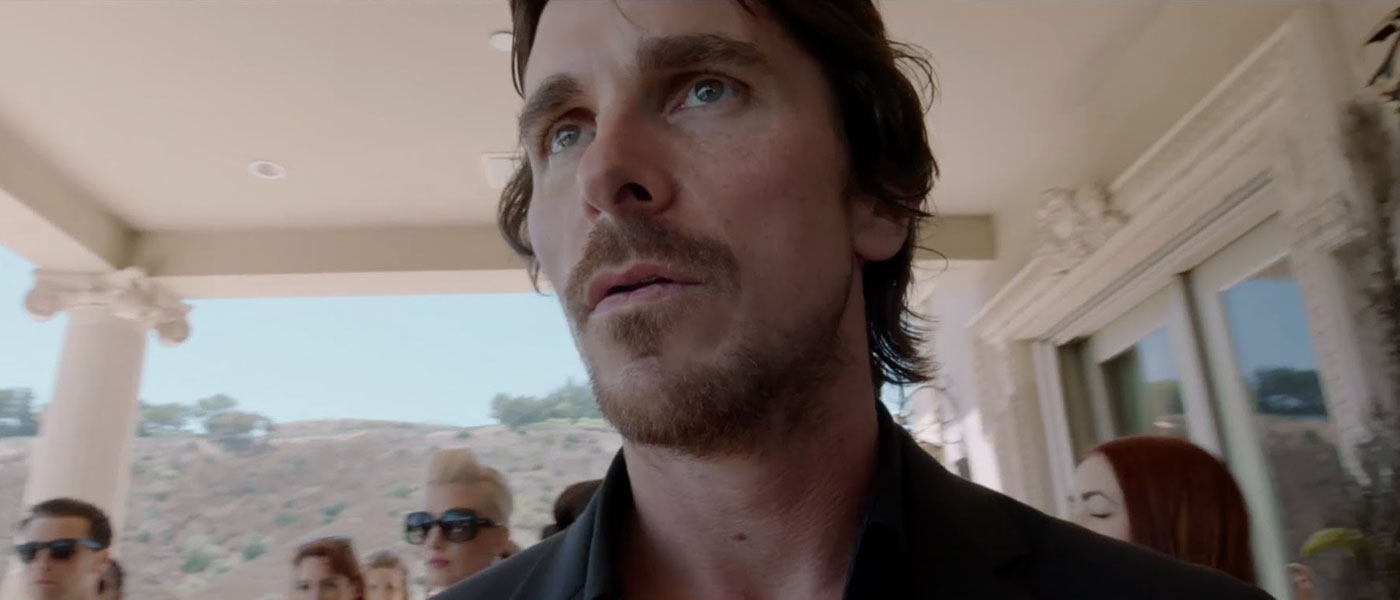‘It’s all supposed to add up to something, but it’s hard to see what in the end’ – MacDara Conroy on Terrence Malick’s Knight of Cups
As a layman when it comes to the work of revered cinematic auteur Terrence Malick, I tend to slot his films, or my perception of them, as few of them as there are, into two broad categories: the narrative ones, with conventional plotting and dialogue scenes augmented by more meditative segments of visual poetry; and those with a story on paper but one that’s communicated much more by interpretation of the sights and sounds he presents on screen. Malick’s first three films – Badlands, Days of Heaven and, 20-odd years later, The Thin Red Line – I’d lump into the former category, while his subsequent filmography, typified by hypnagogic arthouse drama The Tree of Life, are a better fit for the latter.
Which is also the best place to slot Knight of Cups, purported to be Malick’s most experimental work yet and indeed one that almost entirely dispenses with traditional narrative. Ostensibly a loose-in-the-extreme adaptation of The Pilgrim’s Progress, punctuated by chapter headings named for cards in the tarot, and with a mess of other inspirations that’ll go over most heads, Knight of Cups follows the exploits of Rick (Christian Bale), a Hollywood creative type of vague definition whose requisite lifestyle of decadence masks the psychic pain of loss.
Malick presents a string of dissociative, subtly distorted vignettes of Rick’s existence as he tries to make sense of himself through various and varied encounters – with his exasperated ex (Cate Blanchett), his troubled younger brother (Wes Bentley), their dementia-addled father (Brian Dennehy), and a slew of dream-factory denizens, from an emo-goth ingenue (Imogen Poots) to a party-throwing playboy (Antonio Banderas), a stripper with a heart of gold (Teresa Palmer) and so on.
It’s all supposed to add up to something, but it’s hard to see what in the end. It’s a chore, too, to look past these wearisome clichés, and the cribbing of viral hits from the internet (you’ll likely have seen those dogs diving into water for tennis balls before). They make the whole production feel as aimless and unfocused as Rick’s own life, of which this viewer was constantly unsure whether we were seeing his reality or a fantasia of it. On reflection, that could be the ace up Malick’s sleeve, if you’ll pardon my mixing of metaphors: the Knight of Cups tarot card, if it stands for Rick, is a sign of trickery, representing the liminal space between truth and lies. Ah-ha! Maybe Malick is onto something here after all.
In any case, it’s a damn sight more interesting a picture than I Saw The Light, Marc Abraham’s perfunctory biopic of country music sensation Hank Williams. Here’s a film that really looks the part, appropriately colourful and vibrant, shot through with an evocative naturalism. But that naturalism doesn’t extend to the cast. Tom Hiddleston as the titular country pioneer and Elizabeth Olsen as his first wife Audrey are the worst offenders, little more than cosplaying their soulless roles. The plot is no better, skipping from event to event in Williams’ life without grasping at any deeper meaning.
Being in the shadow of the Johnny Cash flick Walk The Line doesn’t help, but surely the ‘Hey, Good Lookin’’ guy deserved better than this. Going by I Saw The Light, all you’d know of him is that he made some records, he burnt some bridges, then he died. Heck, it’s not like a life chewed up and spat out by the music industry could be metaphor for the human condition or anything.
Knight of Cups opens at Dublin’s IFI on Friday May 6th. I Saw The Light opens nationwide on the same date.


